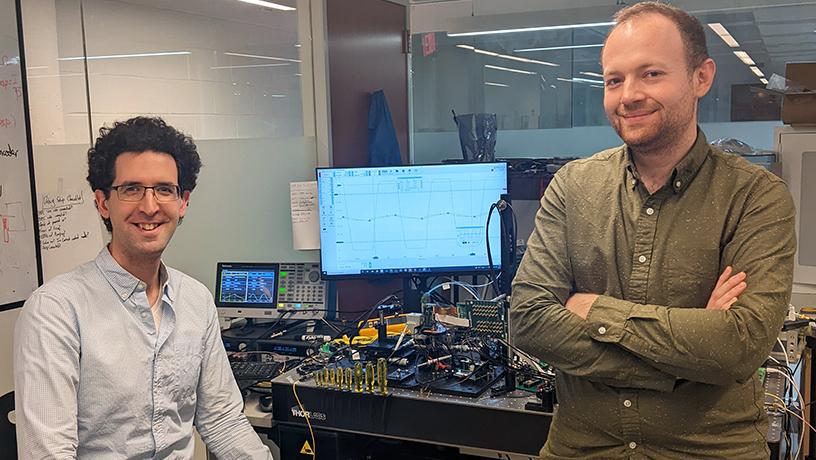Sensing a New Market
Startup founders out of Lipson photonics lab receive $15.4 million investment to make machine sensing tech smaller and cheaper

Voyant Photonics is the latest entrepreneurial brainchild hatched from Columbia’s renowned Lipson Nanophotonics Group lab, headed by Professor Michal Lipson. What began five years ago when the group won an on-campus startup competition has now turned into a $15.4 million investment from key partners.
Voyant is developing a new, smaller and cheaper LiDAR scanner, a kind of sensing technology using lasers and receptors to measure the distance between objects; in the real world, that’s how many modern vehicles monitor their surroundings in order to stay in their lane or stop the car before a collision. This tech is also already used in robotics, from industrial machines to cutting-edge designs, as well as cars and other consumer electronics. But while current devices are large, unwieldy and can cost tens of thousands of dollars, Voyant’s device is meant to be the size of a fingernail and cost much less to produce.
Startup founders Steven Miller and Chris Phare joined the Lipson lab at Columbia Engineering as researchers after both graduated from Cornell University in 2017. The pair were part of the team working on silicon photonics, which are optical arrays built to manipulate light and are used in a host of modern electronic systems. Their team was working on a U.S. Defense Advanced Research Project Agency-funded project to build one of the world’s largest optical phased arrays devices to control how light interacts on a two-dimensional surface, and the two quickly realized the commercial potential for such technology. Their startup placed first in the 2017 Startup Columbia Challenge, and in 2018 the two went on to establish their own entrepreneurial venture. Miller was also in the 2017–2018 cohort of the Translational Fellows program at Columbia.
The Lipson lab has been the springboard for a number of photonics-based projects taking the entrepreneurial plunge. Other current Lipson-based startups include Pharos Imaging, which is making strides in medical imaging, and X-Scape Photonics, which is using light-based technology to make high-end computing more efficient.

Voyant co-founders Steven Miller and Chris Phare
Those who have worked in that lab say there’s a good reason why so many projects are spun out from Lipson’s group. Though they both came from Cornell, Miller said he and his fellow founder had only worked on separate projects up until converging at Columbia Engineering. It was there among the host of talented engineers that they started to cross-pollinate.
“[The Lipson lab’s] culture is very collaborative, and even when grad students are working on separate projects, they're always interacting with each other very, very closely, learning from each other, bouncing ideas off of each other,” he said.
Their latest investment comes from transportation industry financiers UP.Partners with the help of earlier investors LDV Capital and Contour Ventures. It’s a significant boost to an already upward trajectory. The latter two, alongside DARPA, previously raised $4.3 million for Voyant back in 2019.
As much as the transportation industry seems invested in the device, the possibilities inherent to a smaller, more compact LiDAR may well actually be endless. Voyant’s chip boasts thousands of optical components fabricated on a single semiconductor chip, and that makes it enticing for devices that have previously not used LiDAR.
“I think you're going to see LiDAR going into its markets where people haven't really thought about using LiDAR before,” Phare said. “I think there's a lot of long term opportunity in autonomous guided vehicles, but what about really small robots? What about consumer electronics or consumer adjacent electronics?”
“Things like this are really much closer to our everyday life,” he continued, “where LiDAR is basically enabling machines to see objects in 3D can really open up possibilities and let computer vision work that much better.”
[The Lipson lab’s] culture is very collaborative, and even when grad students are working on separate projects, they're always interacting with each other very, very closely, learning from each other, bouncing ideas off of each other.
The foundational IP for the Voyant’s LiDAR chip was licensed from Columbia, and Phare said having that support from the university is integral when approaching investors. He said their team is still in communication with Columbia Technology Ventures executives Gregory Maskel and Orin Herskowitz.
Miller added that this latest multi-million dollar investment will allow the company to box up the first test kits and send them out to customers on a waiting list later this year. It’s an important step for getting real-world feedback. They expect their first full product to launch in the first or second quarter of 2023.
In the meantime, their company is already expanding. Voyant’s new CEO Peter Stern was brought on in the middle of 2020. As their startup takes off, Phare and Miller recognized early the value of bringing aboard somebody who knows the business side of things.
And, afterall, sharing a common vision and a collaborative environment is the biggest key to success.
“I think it's like it's good to have a well balanced team,” Miller said. “That goes for the founding team and it also goes for more people as your team grows.”
